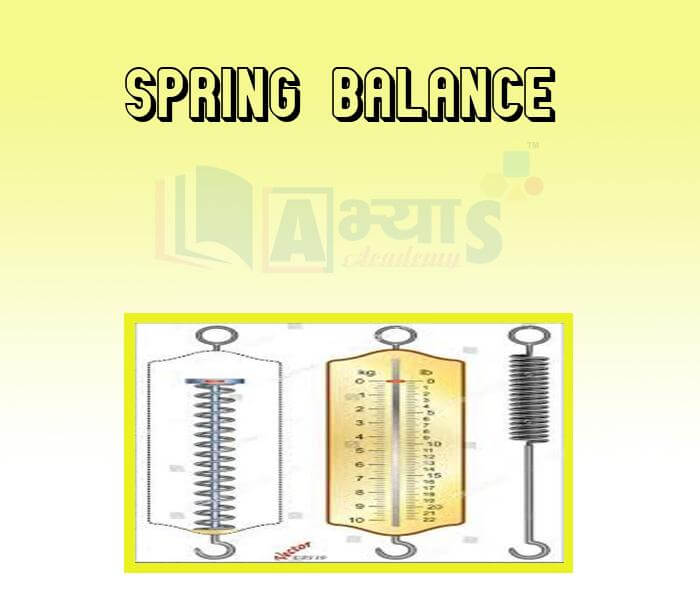Spring Balance












Spring Balance
It is a simple device that can be used for measuring the force acting on body. We can measure the weight of a body. as it is the force with which the object is being pulled by the Earth towards its centre. Spring balance is based on the principle of spring force.
|
Spring balance was invented by British physicist Robert Hooke in 1660. It is used to measure the weight of the object. Spring balance consists of a spring with a hook attached at one end. It has a pointer which can move on a graduated scale indicating the weight. The load is hung in the hook provided on the spring, it expands and this expansion is proportional to the weight of the object. The object to be weighed is attached to the hook of spring balance which is held vertically either from a hook or with a hand. The spring gets stretched due to gravitational pull and hence, the pointer slides downward on the engraved scale. The working principle of the spring balance is Hooke's law. It can be defined as F=−kx. Where F is the force and x is the displacement of the pointer. A spring balance measures the weight of an object by opposing the force of gravity with the force of an extended spring. |
 |
The spring balance work on the principal of ________________________ . | |||
| Right Option : A | |||
| View Explanation | |||
An object is weighted in the following places using a spring balance. In which place will it weigh the heaviest ? | |||
| Right Option : C | |||
| View Explanation | |||
What is K in the formula of spring balance ? | |||
| Right Option : A | |||
| View Explanation | |||
Students / Parents Reviews [10]
My experience with Abhyas academy is very good. I did not think that my every subject coming here will be so strong. The main thing is that the online tests had made me learn here more things.

Hiya Gupta
8thIt has a great methodology. Students here can get analysis to their test quickly.We can learn easily through PPTs and the testing methods are good. We know that where we have to practice

Barkha Arora
10thBeing a parent, I saw my daughter improvement in her studies by seeing a good result in all day to day compititive exam TMO, NSO, IEO etc and as well as studies. I have got a fruitful result from my daughter.

Prisha Gupta
8thAbout Abhyas metholodology the teachers are very nice and hardworking toward students.The Centre Head Mrs Anu Sethi is also a brilliant teacher.Abhyas has taught me how to overcome problems and has always taken my doubts and suppoeted me.

Shreya Shrivastava
8thAbhyas is a complete education Institute. Here extreme care is taken by teacher with the help of regular exam. Extra classes also conducted by the institute, if the student is weak.

Om Umang
10thMy experience with Abhyas is very good. I have learnt many things here like vedic maths and reasoning also. Teachers here first take our doubts and then there are assignments to verify our weak points.

Shivam Rana
7thI have spent a wonderful time in Abhyas academy. It has made my reasoning more apt, English more stronger and Maths an interesting subject for me. It has given me a habbit of self studying

Yatharthi Sharma
10thAbhyas Methodology is very good. It is based on according to student and each child manages accordingly to its properly. Methodology has improved the abilities of students to shine them in future.

Manish Kumar
10thIt was good as the experience because as we had come here we had been improved in a such envirnment created here.Extra is taught which is beneficial for future.

Eshan Arora
8thMy experience was very good with Abhyas academy. I am studying here from 6th class and I am satisfied by its results in my life. I improved a lot here ahead of school syllabus.
